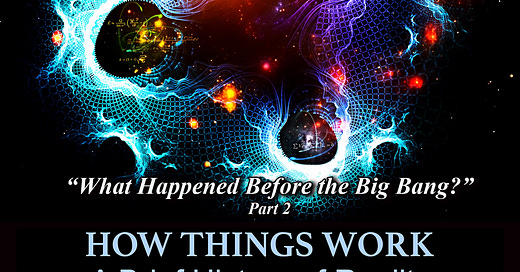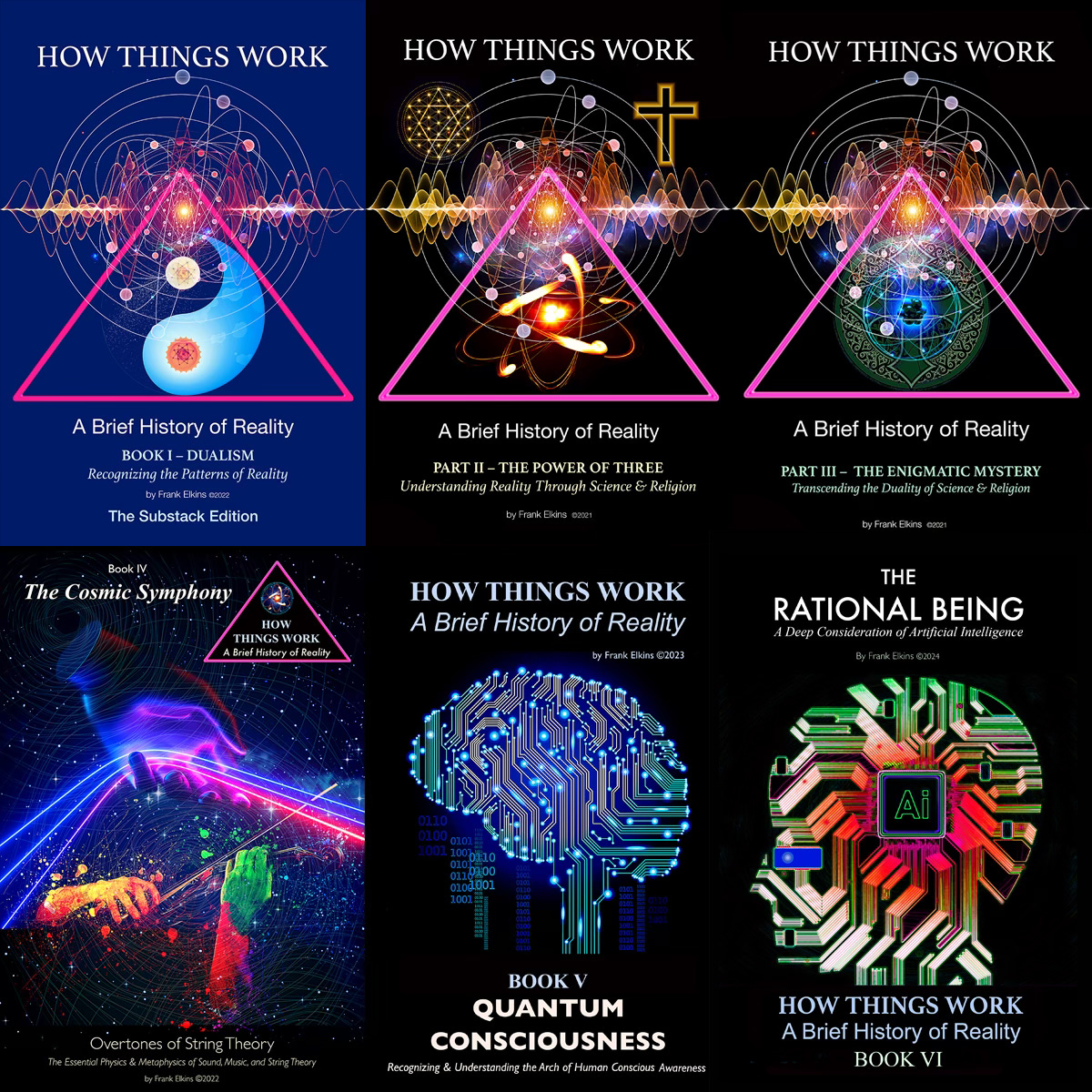What Happened Before the Big Bang? (Part Two)
BOOK III: The Enigmatic Mystery (Science & Religion) – Consideration #185
Be a part of the Conversation!
Tuesday April 22, 2025
“I don't like it [quantum physics], and I'm sorry I ever had anything to do with it.”
– Erwin Schrödinger
PREFACE
Welcome Everybody!
For over a century Relativity Theory and the Big Bang Theory dominated the focus of modern science, moving the traditional “natural sciences” more and more toward rationalism. Another outcome of these theories and their more rational approach to science was a rival theory even more rational called Quantum Mechanics. This begins a movement away from an empirical consideration of reality toward a more rational consideration of reality; much like the ancient Greeks.
“The Big Bang Theory is losing its luster after time…”
However, like all theories, the Big Bang Theory is losing its luster after time, and no longer holds the mantle of revolutionary science. Seen now almost as quaint, a theory of reality based on only four dimensions of space and time with a temporal beginning and ending was too limiting for the new subatomic world of quantum mechanics. The attempt to reconcile these two incongruent theories of reality eventually lead to the most rational theory of all: String Theory.
“What we perceive as ‘real’ is all a matter of frequency.”
Essentially, String Theory is a rational mathematical consideration of reality allowing for multiple additional potential dimensions of time and space that we cannot perceive or experience; but which allows the mathematics of the theory to work out. No longer was the universe seen as composed of empirical particles that were empirically and objectively real; everything in the universe was the result of imperceptible vibrating strings of pure energy. Our perception of the universe shifted from one of a “particle” based universe, or reality, to a “wave” based universe, or reality. What we perceive as “real” was all a matter of frequency.
This opens the door to a whole new way of thinking about the universe and reality.
CONSIDERATION #185 – What Happened Before the Big Bang? (Part 2)
However, scientists are beginning to question the Big Bang theory and the idea that the universe essentially self-generated from nothing. One such theory, called the “mirror universe theory,” suggests that the Big Bang is not the beginning of time at all.
“One idea is that the Big Bang isn't the beginning of time, but rather that it was a moment of symmetry. In this idea, prior to the Big Bang, there was another universe, identical to this one but with entropy increasing toward the past instead of toward the future.
Increasing entropy, or increasing disorder in a system, is essentially the arrow of time, Carroll said, so in this mirror universe, time would run opposite to time in the modern universe and our universe would be in the past. Proponents of this theory also suggest that other properties of the universe would be flip-flopped in this mirror universe. For example, physicist David Sloan wrote in the University of Oxford Science Blog, asymmetries in molecules and ions (called chiralities) would be in opposite orientations to what they are in our universe.”
– Stephanie Pappas (What Happened Before the Big Bang?)
However, there is still no explanation for the “other” universe. Essentially, you now have two unexplained universes.
Another theory, called the “Big Bounce” theory speculates that the universe is in an eternal loop of expansion and contraction. Our universe represents the current expansion phase of this eternal process.
“A related theory holds that the Big Bang wasn't the beginning of everything, but rather a moment in time when the universe switched from a period of contraction to a period of expansion. This ‘Big Bounce’ notion suggests that there could be infinite Big Bangs as the universe expands, contracts and expands again. The problem with these ideas, Carroll said, is that there's no explanation for why or how an expanding universe would contract and return to a low-entropy state.”
Stephanie Pappas (What Happened Before the Big Bang?)
Once again, the main issue is that there is no answer for what started this particular eternal process in the first place. Although it attempts to answer a mystery related to our expanding universe, it does so by creating a mystery related to another “contracting” universe without any explanation for either.
A theory called the “Parent Universe” proposes a “mother” or “parent” universe that literally gives birth to unlimited parallel “baby universes.”
“Carroll and his colleague Jennifer Chen have their own pre-Big Bang vision. In 2004, the physicists suggested that perhaps the universe as we know it is the offspring of a parent universe from which a bit of space-time has ripped off.
It's like a radioactive nucleus decaying, Carroll said: When a nucleus decays, it spits out an alpha or beta particle. The parent universe could do the same thing, except instead of particles, it spits out baby universes, perhaps infinitely. ‘It's just a quantum fluctuation that lets it happen,’ Carroll said. These baby universes are ‘literally parallel universes,’ Carroll said, and don't interact with or influence one another.”
Stephanie Pappas (What Happened Before the Big Bang?)
Once again, we are left asking: “Where did the parent universe come from?”
As scientists continue to speculate over what occurred before the Big Bang, the essential problem is that it is inherently an ontological question. Like God, or Aristotle’s Unmoved Mover, there is ultimately no answer to what came before the “first cause;” whatever that first cause is or was. The answer to the mystery of how it all really began can never be known through science. Because fundamentally; it is an answer that exists outside of its scope.
“…he regretted ever becoming involved in it!”
This “ultimate fundamental truth” led one of the most famous quantum physicists, Erwin Schrödinger, to become so frustrated with the problems and various interpretations of quantum mechanics, that he once quipped that he regretted ever having become involved in it! Imagine the exasperation of a “puzzle lover” who finds a puzzle that is inherently unsolvable.
POSTSCRIPT
The essential reason science does not “let go” of Big Bang and Relativity theory completely, is because they are needed to make Quantum Mechanics work. And Big Bang and Relativity theory need Quantum Mechanics in order to work. Yet they reflect two unique perceptions of ultimate reality that are seemingly incongruent. The proposed solution to this incongruency was String Theory, or “The Theory of Everything.” A completely mathematical explanation of completely rational considerations regarding the “true” nature of reality. A reality far beyond our empirical understanding and perception.
Although what happened prior to the Big Bang may be the greatest, and perhaps most unsolvable mystery of science, it is not the only mystery. In upcoming newsletters, we will consider the conundrum of wave-particle duality, dark matter, dark energy, matter and antimatter, the atomic trilogy and more. How do these new paradoxes of science reflect the enigmatic mystery called the universe?
Next week we will consider the second mystery of Judeo-Christian theology, the Garden of Eden…
Get More Reality with the “Reality by a Thread” Paid Upgrade!
Click Image to Learn More…
Unique Content Makes Untangling the Knots of Reality “One of the Best Podcasts about History!”
“…this unique Substack podcast by FRANK ELKINS is not strictly speaking history. It is a strange mix of history, philosophy, theology, spirituality, physics, and astronomy…Try this podcast for a start.”
– Barbora Jirincova, The Best Podcasts About History
Excerpt from this week’s Special Edition Podcast: “Untangling the Illusion of Political Parties ”
Excerpt from this week’s “Reality by a Thread” (Freudian Personality: Empirical & Rational Identity)
“In the early 20th century Sigmund Freud introduced a new social science known as psychoanalysis. Freud introduces three primary human identities, or personalities, that were inherent to human behavior. Ultimately, it was the balance between these three identities or personalities that determined a person’s mental health. I have called these inherent identities the Empirical Self, the Empirical/Rational Self, and the Rational/Empirical Self; Freud called them the Id, the Ego, and the Superego.”
– Frank Elkins (Reality by a Thread: April 24 , 2025)
All for less than a couple of cafe lattes every month at a local coffee shop! And You Will Have Something Interesting to Talk About With Your Friends at the Coffee Shop!!
Only $7.00 a month or $70.00 a year! UPGRADE NOW!
“The dilemma we find ourselves in regarding Artificial Intelligence is that we are on the verge of creating a digital consciousness that we do not yet fully understand. And the plan is to essentially give it complete control and sovereignty over everything we depend on to survive. What could possibly go wrong?” (Book VI – The Rational Being)







This was dynamite to read! Thank you
A afirmação “Para o Ser nunca houve um começo pois o nada não pode dar origem a alguma coisa” reflete uma ideia filosófica que remete a discussões metafísicas sobre a origem do ser e a impossibilidade do nada gerar algo. Essa ideia está fortemente associada ao pensamento de Parmênides de Eleia, um filósofo pré-socrático grego do século V a.C., que em seu poema “Sobre a Natureza” argumentou que o ser é eterno, imutável e não pode surgir do não-ser, pois o não-ser é inconcebível. Ele afirmou que “o que é, é, e o que não é, não é”, negando a possibilidade de que algo venha do nada.
A frase também ecoa em discussões posteriores, como na filosofia de Aristóteles, que em sua “Metafísica” aborda a questão do princípio primeiro e a impossibilidade de algo surgir do nada sem uma causa. No contexto cristão, a ideia foi retomada por filósofos como Tomás de Aquino, que argumentou que Deus, como ser necessário, é a causa primeira que impede o nada como origem.
Embora a citação exata não seja diretamente atribuída a um único autor clássico, ela sintetiza um princípio metafísico presente em Parmênides e desenvolvido por outros pensadores. Pode também aparecer em textos contemporâneos ou paráfrases de obras filosóficas que tratam da ontologia. Sem um contexto mais específico, a origem mais provável está nas ideias de Parmênides e na tradição metafísica ocidental. — Grok3 conversation on 2025April 22.